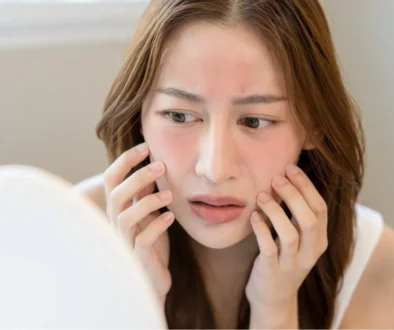Hormonal Imbalance in Women: Understanding the Symptoms and Solutions
Hormonal changes are a natural process of being a woman, but they can be beyond normal. When hormones become too high and/or too low, the impact can be seen both physically and mentally. Many women experience symptoms of hormonal imbalance, or what is also called hormonal disbalance symptoms, but may not recognise them right away. These symptoms can affect energy levels, mood, weight, skin health, and even menstrual cycles.
In this blog, we will discuss the common signs, causes, and treatments for hormonal imbalance in women, and when you should seek medical advice.
What is Hormonal Imbalance?
Hormones are chemical messengers that govern a wide range of biological processes, including growth, metabolism, mood, reproduction, and sleep. In women, the main reproductive hormones include estrogen, progesterone, and small amounts of testosterone. When these hormones are not in balance, it is called a hormonal imbalance.
This condition can happen at any age, but it is most common during puberty, pregnancy, post-partum, and menopause. However, lifestyle factors, medical conditions, and stress can also cause hormone irregularities at other stages of life.

Common Symptoms of Hormonal Imbalance in Women
Hormonal changes can cause many physical and emotional symptoms. Recognising hormonal disbalance symptoms early can help in getting proper treatment.
1. Irregular Periods
Changes in your monthly cycle, such as missed periods, greater or lighter flow, or unexpected cycles, are among the most prevalent signs of hormonal imbalance.
2. Unexplained Weight Changes
Thyroid Disorders: Endocrine imbalance symptoms can be caused by either hypothyroidism or hyperthyroidism. Hormones directly affect metabolism, appetite, and fat storage.
3. Fatigue and Low Energy
Feeling constantly tired, even after enough rest, could be linked to hormone issues. Cortisol, thyroid hormones, and reproductive hormones all play a role in energy levels.
4. Mood Swings and Anxiety
Hormone irregularities symptoms often include irritability, mood swings, or feelings of anxiety and depression. This is due to the close connection between hormones and brain chemistry.
5. Skin and Hair Changes
Acne, thinning hair, or unwanted hair growth on the face and body can be signs of a hormonal imbalance.
Causes of Hormonal Imbalance in Women
There are numerous causes of symptoms of hormonal disbalance in women. They can include:
- Polycystic Ovary Syndrome (PCOS) – A common disorder that changes hormones, ovulation, and periods.
- Thyroid Disorders: symptoms of endocrine disbalance can be attributed to both hypothyroidism and hyperthyroidism.
- Pregnancy and post-partum changes – Hormones change drastically during and after pregnancy.
- Menopause and Perimenopause – These natural life stages cause a drop in estrogen and progesterone.
- Stress – Chronic stress boosts cortisol levels, which can interfere with other hormones.
- Poor Diet and Lifestyle – A lack of nutrition, irregular sleep, and sedentary habits can lead to symptoms of hormone irregularities.
When to See a Doctor
If you still have indications of hormone imbalance, contact a doctor. Early treatment for hormone imbalance may lessen your risk of problems like osteoporosis, chronic fatigue, or infertility. To help you with hormone health, the experts at Lifeline Clinic Dubai offer individualised assessment and treatment plans.

Hormonal Imbalance Diagnosis
Doctors can employ a range of tests to evaluate your hormone levels, including:
- Blood tests for estrogen, progesterone, testosterone, and thyroid hormone levels
- Ultrasound imagery to assess the reproductive organs
- Pelvic examination to look for any abnormalities.
It’s essential to understand the actual cause to provide effective treatment.
Treatment options for hormonal disbalance
The treatment outlined for symptoms of hormonal disbalance hinges on the cause, the patient’s age, and the severity of the issue. Most treatment generally consists of one or all of the following:
1. Lifestyle Changes
Making healthier lifestyle changes by eating a balanced diet, exercising, and improving sleep is a good start to improving symptoms of an endocrine imbalance.
2. Medication and Hormonal Therapy
Your doctor may prescribe hormone contraceptives, hormone replacement therapy, thyroid medications, or insulin (for PCOS or diabetes) or not.
3. Natural remedies and supplements
Some vitamins, minerals, and herbal/homoeopathic supplements can be beneficial to hormone balance. Use these only under the guidance of a medical professional.
4. Stress Management
Meditation, yoga, and breathing techniques can help lower cortisol levels while also balancing other hormones.
Is Hormonal Imbalance Preventable?
Some hormones change naturally, but many can be prevented or minimised by establishing healthy habits:
- Eat a nutrient-dense diet that includes enough protein and healthy fats.
- Maintain a healthy weight.
- Exercise regularly.
- Get enough sleep.
- Reduce stress
- Avoid smoking and limit alcohol

Living with Hormonal Imbalance
Managing hormonal imbalance symptoms can take time, but with the proper care, most women can lead a healthy life. Regular checkups and open discussion with your doctor are essential.
If you suspect you have hormone irregularity symptoms, do not ignore them. The sooner you seek help, the better the chances of restoring balance.
Get Professional Support at Lifeline Clinic Dubai
The physicians at Lifeline Clinic Dubai understand that changes in hormones can affect every area of your life. Our physicians use state-of-the-art diagnostic procedures and personalised therapies to help you with your symptoms resulting from hormone imbalance. Begin your journey to gain better health now. Schedule your consultation with our specialists, and regain your balance.




